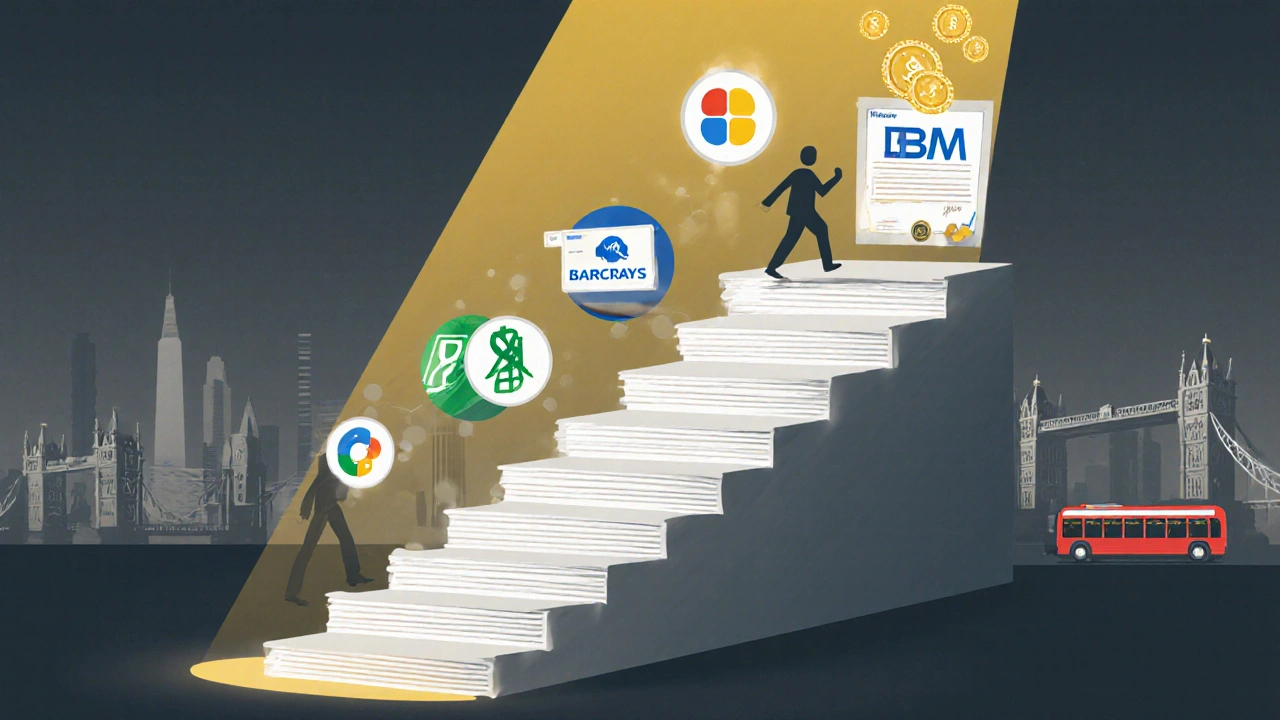
London is one of the top cities in the world for data analytics jobs. Companies from finance to healthcare are hiring data analysts faster than they can train them. If you’re thinking about switching careers or boosting your skills, taking a data analytics course in London isn’t just a good idea-it’s one of the smartest moves you can make right now.
What You’ll Actually Learn in a Data Analytics Course
Not all data analytics courses are the same. Some teach you how to make pretty charts in Excel. Others prepare you to clean messy datasets, write SQL queries, build dashboards in Power BI, and use Python for automation. The best programs in London focus on real-world tasks you’ll face on the job.
For example, Imperial College London’s Data Analytics Bootcamp teaches you how to extract sales data from a retail database, identify customer trends using clustering, and present findings to non-technical managers. That’s not theory-it’s exactly what hiring managers want to see on your resume.
You’ll typically cover:
- SQL for querying databases
- Excel pivot tables and advanced functions
- Power BI or Tableau for visual reporting
- Python (Pandas, NumPy) for automation
- Statistical analysis basics (mean, median, correlation)
- Working with real datasets from public sources like the UK Office for National Statistics
Most full-time courses last 8 to 12 weeks. Part-time options run 3 to 6 months, with evening or weekend classes. You won’t need a math degree. If you can understand spreadsheets and follow step-by-step instructions, you can succeed.
Which Certificates Matter Most in London?
There are dozens of certificates floating around. But employers in London care about a few key ones.
Google Data Analytics Professional Certificate is the most recognized. It’s affordable, online, and taught by Google’s own data analysts. Over 80% of hiring managers in London say they’ve hired someone with this certificate. It covers the full analytics pipeline-from data cleaning to storytelling with visuals.
Microsoft Certified: Data Analyst Associate (PL-300) is the gold standard if you’re aiming for roles in finance, retail, or public sector jobs. It tests your ability to use Power BI to build interactive dashboards and connect live data sources. Many London-based banks require this certification for junior analyst roles.
IBM Data Analyst Professional Certificate on Coursera is another solid choice. It includes hands-on projects using real datasets from healthcare and transportation sectors-useful if you’re targeting NHS or transport companies.
Don’t waste time on certificates that don’t include practical projects. Employers don’t care if you passed a quiz. They want to see what you built.
Where to Take These Courses in London
London has dozens of options, from university bootcamps to private academies. Here are the top three based on job placement rates and employer feedback:
- Imperial College Business School - Their 12-week intensive bootcamp has a 92% job placement rate within 3 months. Graduates land roles at HSBC, Deloitte, and Transport for London. Cost: £3,800.
- General Assembly London - Offers both in-person and online data analytics courses. Their 10-week program includes a capstone project with a real client. Alumni work at Spotify, Monzo, and BBC. Cost: £2,950.
- Code First Girls - Focused on women and non-binary learners, this nonprofit offers free and low-cost courses. They partner with Accenture and Barclays. Many students land internships after completing the course. Cost: £0-£750.
There are also free options. The London Data Science Meetup hosts monthly workshops. The British Library offers free data literacy sessions. These won’t give you a certificate, but they’re great for networking and trying things out before you commit.

What Jobs Can You Get After the Course?
After completing a solid course, you’re not just qualified-you’re competitive. Here are the most common entry-level roles in London:
- Data Analyst - Average salary: £42,000. You’ll pull data, create reports, and help teams make decisions. Common in retail, logistics, and marketing.
- Business Intelligence Analyst - Average salary: £48,000. You’ll build dashboards and track KPIs. Most common in finance and e-commerce.
- Operations Analyst - Average salary: £40,000. You’ll optimize processes using data. Think supply chain, NHS waiting times, or warehouse efficiency.
- Marketing Analyst - Average salary: £38,000. You’ll analyze campaign performance, customer behavior, and ad spend ROI.
Companies hiring right now include:
- Barclays and HSBC (finance)
- Boots and Tesco (retail)
- NHS Digital and Great Ormond Street Hospital (healthcare)
- Amazon and Ocado (e-commerce)
- Transport for London and Network Rail (public transport)
Many of these roles don’t require a degree. What they do require? A portfolio of projects. Build three solid ones: one using public UK data, one using a mock retail dataset, and one analyzing social media trends. Put them on GitHub or a simple website. That’s what gets you the interview.
How to Stand Out in a Crowded Market
There are thousands of people taking data analytics courses in London. What makes you different?
First, specialize. Don’t say you’re a “data analyst.” Say you’re a “retail data analyst” or a “healthcare data analyst.” Employers hire for niche skills, not generalists.
Second, learn to tell stories with data. You can run a perfect regression, but if you can’t explain why it matters to someone who doesn’t know what a p-value is, you won’t get promoted. Practice presenting your findings like you’re talking to your mum-not your professor.
Third, get comfortable with Excel. Yes, Python is sexy. But 70% of entry-level data analyst jobs in London still require advanced Excel. Know VLOOKUP, INDEX-MATCH, pivot tables, and conditional formatting inside out.
Fourth, join local meetups. The London Data Science Community meets every other week at WeWork in Shoreditch. You’ll meet hiring managers, get feedback on your projects, and hear about unadvertised roles.
Real Success Stories from London
Sarah, 34, was a customer service rep at a phone company. She took the Google Data Analytics Certificate part-time while working. After six months, she built a dashboard tracking call center performance using public ONS data. She applied to five roles. Got three interviews. Landed a £45,000 job at a fintech startup.
James, 28, studied history at university. He had no tech background. He took the Imperial College bootcamp. Did his capstone project analyzing London tube delays using TfL open data. Got hired by Transport for London as an Operations Analyst. Now he’s training new hires.
These aren’t rare cases. They’re typical. The barrier to entry is low. The payoff is high.

How Much Does It Cost?
Costs vary wildly:
- Free: Meetups, YouTube tutorials, Kaggle datasets
- £50-£200: Online certificates (Coursera, Udemy)
- £2,500-£3,500: In-person bootcamps (General Assembly, Imperial)
- £5,000+: University short courses (LSE, UCL)
Many employers in London offer training budgets. Ask your current company if they’ll pay for a course if you commit to staying for a year. Some even cover exam fees for Microsoft or Google certifications.
If you’re on benefits, check with Skills for Londoners. They fund free or discounted training for eligible residents.
What’s Next After the Certificate?
Getting the certificate is step one. Step two is getting hired. Step three is growing.
After your first job, aim for:
- Learning SQL deeper-window functions, CTEs
- Getting certified in Python or R
- Building automation scripts that save your team hours
- Moving into data science or business analytics roles
Many analysts in London transition into data science roles within 2-3 years. The jump isn’t as hard as people think. You already know the data. Now you just need to learn modeling.
Don’t wait for permission to start. Use free tools. Download public datasets. Try to answer one question every week: Why did sales drop in East London last month? What’s the most common reason for hospital readmissions? Find the answer. Share it. That’s how you build a career.
Do I need a degree to become a data analyst in London?
No. Most entry-level data analyst roles in London don’t require a degree. Employers care more about your ability to clean data, build dashboards, and explain insights. A certificate with real projects carries more weight than a degree without hands-on experience.
How long does it take to get hired after a course?
Most people land a job within 1 to 3 months after finishing a course, especially if they’ve built a portfolio. Those who actively network, attend meetups, and apply to 5-10 jobs a week usually get offers faster. The job market is hot-there are more openings than qualified candidates.
Can I do this while working full-time?
Yes. Many courses in London are designed for working professionals. Evening and weekend classes are common. Online options like Google’s certificate let you learn at your own pace. You can complete a full course in 3-6 months while keeping your job.
Is Python necessary for entry-level roles?
Not always, but it helps. About 60% of London data analyst jobs list Python as a preferred skill. You can start with Excel and SQL, then learn Python later. But if you want to grow beyond entry-level, Python is essential for automation and advanced analysis.
What’s the salary difference between certified and non-certified analysts?
Entry-level analysts with recognized certifications like Google or Microsoft earn 15-20% more on average than those without. Employers see certification as proof you’ve been trained to industry standards. It reduces their hiring risk.
Final Thoughts: Start Now, Not Later
The data analytics job market in London isn’t slowing down. It’s accelerating. Companies are drowning in data and desperate for people who can make sense of it. You don’t need to be a math genius. You don’t need to code for hours every night. You just need to start.
Take one course. Build one project. Apply to one job. That’s all it takes to begin.